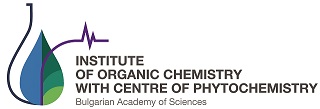Mission
The Institute of Organic Chemistry with Centre of Phytochemistry at the Bulgarian Academy of Sciences carries out basic and applied research, training and expert activities in the field of organic, organometallic and bioorganic chemistry, development of experimental synthetic, spectral and computational approaches aimed at elucidating strategies for the design and synthesis of new compounds, materials and pathways for the study of natural products. The institute has initiated the development of a national program on „Smart Utilization of Biodiversity in Bulgaria for Economic Development and Sustainable Growth“. In this regard, is being working on the use of green technologies for sustainable utilization of Bulgaria's natural resources (medicinal and aromatic plants, waste from the processing of plant raw materials, and some mineral raw materials).
Through its activities, the Institute of Organic Chemistry with a Centre for Phytochemistry also contributes to the creation and dissemination of new knowledge in the field of „Nanosciences, new materials and technologies“, which helps for the sustainable growth of the Bulgarian economy and creating of a knowledge-based and innovation-driven society, in line with the policy and priorities of the European Union.
The scientific research activity of IOCCF-BAS is focused on the following thematic areas:
• Conducting research to find biologically active compounds in medicinal and aromatic plants. Development of methods for qualitative and quantitative analysis of active components in plant species and their extracts;
• Development of methods for preparation of new multifunctional organic compounds and materials with applications in life sciences and nanotechnology;
• Development and application of analytical approaches based on modern spectral methods (NMR spectroscopy, mass spectroscopy and chromatography, molecular spectroscopy) for structural qualitative and quantitative analysis of synthetic and natural biologically active substances and new functional materials of interest to the pharmaceutical, cosmetic and/or food industry;
• Development of methods to assess the authenticity and quality of foods such as fats, oils, honey, etc.;
• Study of the structure, function, stability and interactions of enzymes and proteins with low-molecular-weight compounds. The main object of interest are enzymes and proteins that are potential targets for new therapeutics or regulate various biochemical processes;
• Development of novel meso/microporous nanomaterials with applications as adsorbents and catalysts for air and wastewater purification, hydrogen production, biomass utilization and as carriers for controlled drug delivery;
• Development of methods for enzymatic transformation of different groups of organic compounds to produce food additives and flavours, functional and medicinal foods, etc.;
• Development of enzymatic methods for the detection, use and/or recovery of waste from the food, cosmetics, pharmaceutical, chemical and other industries;
• Computer modelling and numerical simulations of complex molecular and supramolecular functional systems and materials.
The research carried out at IOCCF-BAS are part of the five of the priority areas in the National Strategy for Research Development 2017-2030:
• Health and quality of life. Prevention, early diagnosis and therapy. Green, blue and eco-technologies, biotechnologies, eco-foods;
• Mechatronics and clean technologies;
• Environmental protection. Environmental monitoring. Utilisation of raw materials and bioresources. Wastewater and zero-waste technologies;
• National Identity and Development. Socio-economic development and management;
• Modern energy sources and energy efficient technologies.



